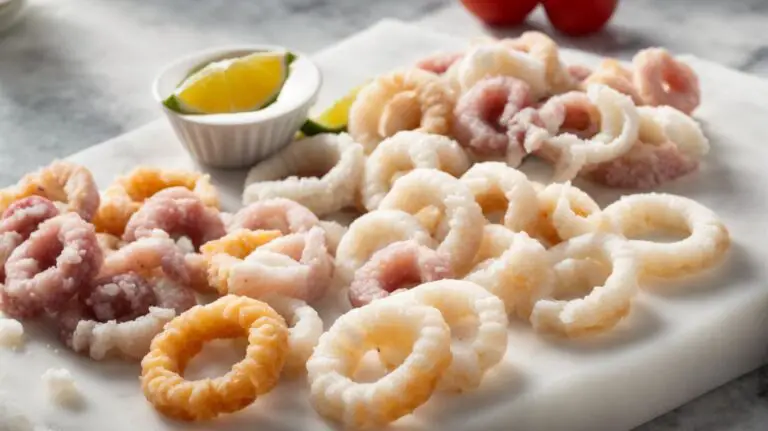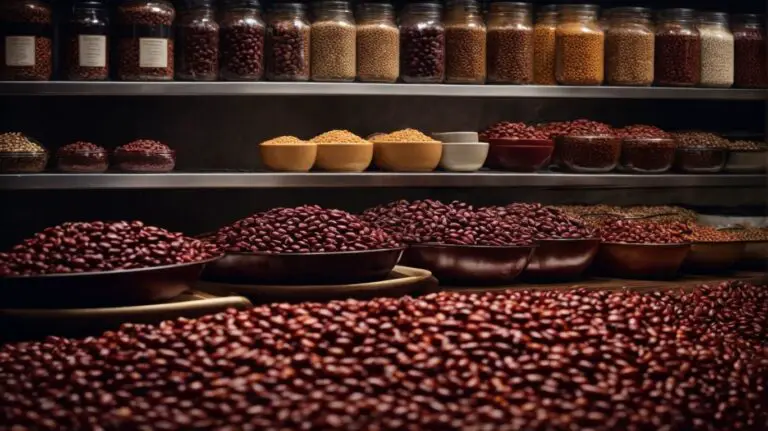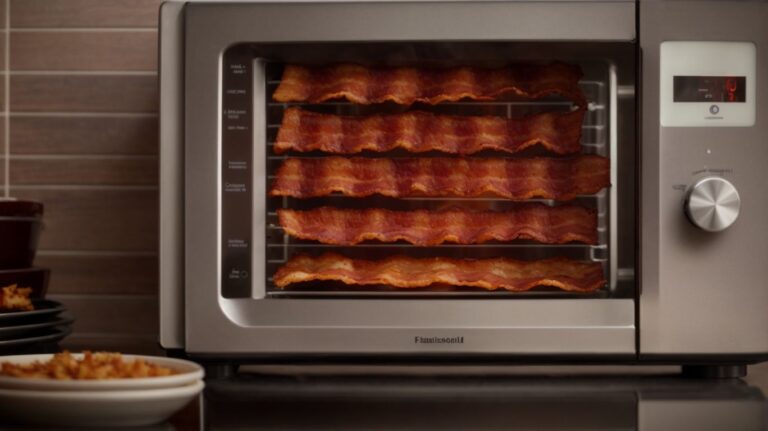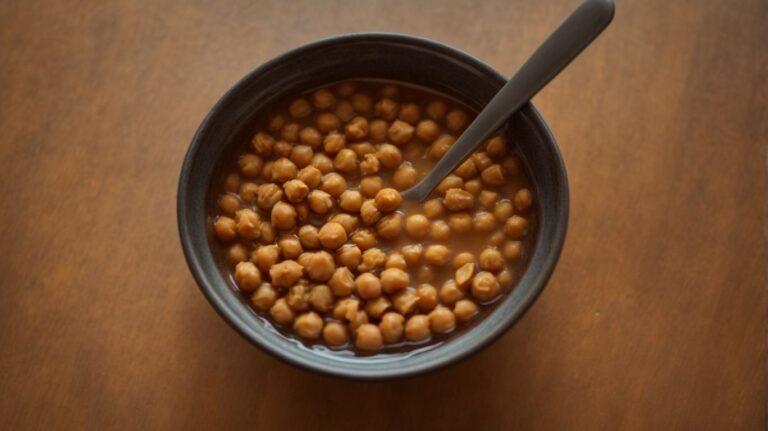How to Cook Carrots for Baby?
Are you looking to introduce nutritious and delicious carrots into your baby’s diet?
Discover why carrots are a great choice for your little one, the nutritional benefits they offer, and when you can start incorporating them into meals.
Learn how to choose, prepare, and cook carrots for your baby, along with simple and tasty carrot baby food recipes.
Find tips and tricks on making carrots more palatable and storing leftover baby food. Elevate your baby’s meals with the goodness of carrots!
Key Takeaways:
Introducing Carrots to Your Baby’s Diet
Introducing carrots to your baby’s diet can be a nutritious and exciting experience for both you and your little one.
In terms of weaning your baby onto solid foods, it’s essential to offer a variety of flavors and textures to help them develop diverse taste preferences and meet their nutritional needs. Carrots are a fantastic choice as they are rich in beta-carotene, which supports healthy eyesight and immune function.
Introducing carrots as a finger food can also aid in your baby’s development of fine motor skills as they grasp and gnaw on the vegetable. To do this safely, ensure that the carrots are cooked until they are soft enough to be easily squished between your fingers.
Why Choose Carrots for Your Baby?
Opting for carrots as a part of your baby’s diet is a wise choice due to their plethora of health benefits and essential nutrients.
Carrots are packed with vitamins like A, C, and K, crucial for your little one’s growth and development. They are a great source of minerals such as potassium, aiding in maintaining healthy blood pressure levels. The rich antioxidants present in carrots, including beta-carotene, help support your baby’s immune system and promote good eye health.
What Are the Nutritional Benefits of Carrots?
Carrots are a powerhouse of essential nutrients, providing vitamins, minerals, antioxidants, and fibers crucial for your baby’s growth and development.
Their bright orange color signifies a high content of beta-carotene, a precursor to Vitamin A essential for maintaining good vision and a healthy immune system. Plus beta-carotene, carrots are rich in calcium, vital for strong bones and teeth, and vitamin K, which plays a key role in blood clotting and bone health. Incorporating carrots into your baby’s diet can help support their overall well-being and boost their nutritional intake.
When Can Babies Start Eating Carrots?
Babies can typically start eating carrots around the age of 6 months, as part of their weaning journey, to introduce them to new flavors and essential nutrients.
Introducing carrots early in a baby’s diet is beneficial due to their rich content of nutrients like beta-carotene, Vitamin A, and fiber, which are essential for healthy growth and development. Carrots are also known for their natural sweetness and appealing bright orange color, making them a favorite among little ones. Including carrots during the weaning process can help babies develop a taste for vegetables from an early age, setting a foundation for healthy eating habits later in life.
How to Choose and Prepare Carrots for Your Baby
Selecting and preparing carrots for your baby involves a few simple steps to ensure they receive the maximum nutritional value and flavor from this versatile vegetable.
When choosing carrots for your little one, opt for organic varieties to minimize exposure to harmful pesticides that can be found on conventionally grown produce. Look for small to medium-sized carrots that are firm and vibrant in color, as they tend to be sweeter and more tender.
Once you have selected the perfect carrots, there are multiple ways to cook them to cater to your baby’s preferences. Steaming carrots preserves most of their nutrients, while roasting enhances their natural sweetness. Pureeing cooked carrots can help introduce new spices to your baby’s palate.
If your baby is experiencing constipation, carrots are a great choice as they are rich in fiber and can help promote healthy digestion. The different preparation methods allow you to tailor the carrots to suit your baby’s needs and ensure they enjoy this nutritious vegetable in various forms.
What to Look for When Buying Carrots for Your Baby
When buying carrots for your baby, it’s essential to select fresh, organic produce and store them properly to maintain their flavor and nutritional value.
High-quality carrots not only provide essential vitamins and minerals for your baby’s growth but also offer a delicious and versatile ingredient for various baby food recipes. To ensure the longevity of carrots, store them in a cool, dark place or refrigerator to prevent them from becoming soft or losing their crisp texture. When cooking for infants, refrain from adding spices like nutmeg or cloves, as they may cause digestive issues or allergies. Opt for mild flavors to enhance the natural sweetness of carrots and promote your baby’s healthy eating habits.
How to Properly Wash and Peel Carrots
Washing and peeling carrots correctly is crucial to remove any dirt or pesticides, ensuring your baby’s food is safe and healthy.
Here are the steps to wash and peel carrots for your baby:
- Start by rinsing the carrots under cold running water to remove any visible dirt or debris.
- Use a vegetable brush to scrub the carrots thoroughly, especially if they are not organic.
- Peel the carrots using a clean vegetable peeler to remove the outer layer where most of the pesticides may reside.
When selecting utensils for this task, opt for a designated vegetable brush and a sharp vegetable peeler to make the process easier and more efficient.
To prevent contamination, wash your hands thoroughly before handling the carrots, and ensure all utensils are clean and sanitized. Always supervise your baby while they are eating carrots to avoid any potential choking hazards.
Methods of Cooking Carrots for Baby
Various cooking methods can be used to prepare carrots for your baby, ensuring they are cooked safely and free from potential allergens.
Steaming carrots is a popular method as it helps retain most nutrients, flavor, and color. Simply chop the carrots into small pieces, place them in a steamer basket over boiling water, and steam until tender.
Roasting carrots in the oven with a drizzle of olive oil and seasoning can bring out their natural sweetness while adding a lovely caramelized touch.
Another option is pureeing cooked carrots to make a smooth and easily digestible baby food. When preparing any food for your baby, always ensure that utensils, cutting boards, and hands are thoroughly cleaned to prevent cross-contamination.
Simple Carrot Baby Food Recipes
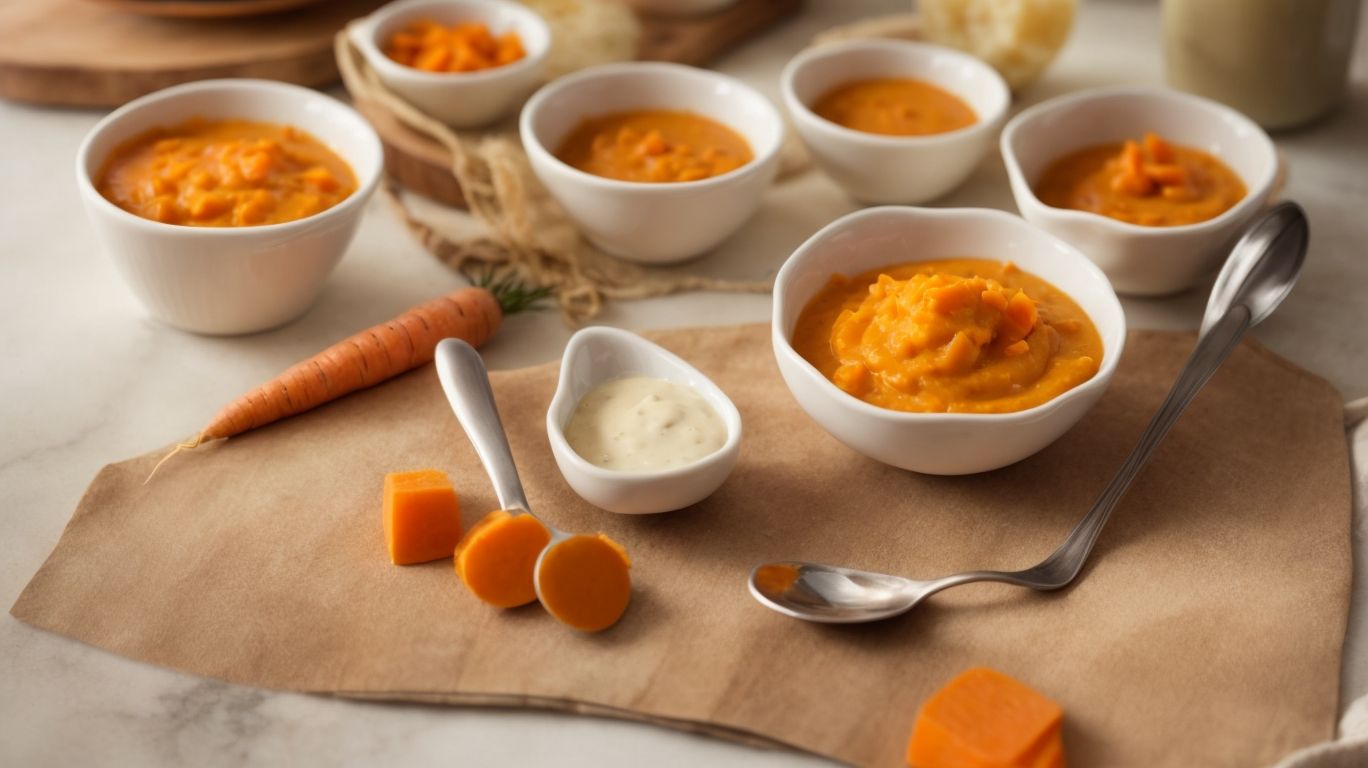
Credits: Poormet.Com – Bruce Nelson
Prepare delicious and nutritious carrot baby food recipes that are packed with essential nutrients and can be enhanced with gentle seasonings.
Carrots are a great source of beta-carotene, which is essential for healthy eyesight and immune function.
For a simple carrot puree, steam or boil chopped carrots until tender, then blend until smooth. You can add a pinch of cinnamon or a dash of nutmeg for a hint of warmth.
Another tasty option is carrot and apple mash, combining the sweetness of apples with the earthy flavor of carrots. Simmer the two ingredients together until soft, then mash or puree for a delicious meal.
Carrot Puree
Carrot puree is a smooth and nutritious option for introducing this vegetable to your baby, ensuring they receive essential nutrients in an easily digestible form.
Making carrot puree at home is a simple process that involves just a few steps. Start by washing and peeling fresh carrots, then chop them into small pieces for quicker cooking. Boil the carrot pieces until they are soft and can be effortlessly mashed. Next, blend the cooked carrots in a food processor or blender until you achieve a smooth, creamy consistency.
Carrot puree is ideal for babies as it provides a gentle transition to solid foods, promoting healthy digestion and exploring new flavors. The smooth texture is easily palatable for infants, making it a great addition to their early diet.
Carrots are rich in vitamin A, which supports healthy vision and immune function. They contain fiber and antioxidants that contribute to overall well-being and aid in digestion. Including carrot puree in your baby’s meals can help in boosting their intake of these essential nutrients.
Carrot and Apple Mash
Combining carrots and apples in a mash offers a sweet and nutritious blend that introduces different flavors and textures to your baby’s palate.
Carrots are rich in beta-carotene, a precursor to vitamin A that supports your little one’s vision and immune system. Apples bring a natural sweetness and provide essential fiber for healthy digestion. Blending these two ingredients creates a vibrant orange-colored mash that is visually appealing and nutrient-packed. The soft texture of the mash makes it easy for babies to eat, aiding in their transition to solid foods and helping them explore new tastes. As your baby grows, you can customize the recipe by adding a sprinkle of cinnamon or nutmeg for added flavor complexity.
Carrot and Sweet Potato Mash
The combination of carrots and sweet potatoes in a mash creates a vibrant and nutrient-rich dish that is ideal for your baby’s development and taste exploration.
Carrots are packed with beta-carotene, which is essential for your baby’s eye health and overall growth. Sweet potatoes, on the other hand, are a great source of vitamin A and fiber, promoting digestion and immune function. Combined, these ingredients offer a powerhouse of nutrients for your little one.
To prepare this dish, simply steam peeled and chopped carrots and sweet potatoes until tender. Then, mash them together until you reach a smooth consistency that is easy for your baby to eat.
If your baby enjoys a sweeter taste, you can add a sprinkle of cinnamon or a drizzle of maple syrup to the mash. For a savory twist, a pinch of garlic powder or a dash of olive oil can elevate the flavors.
Introducing Carrots to Your Baby’s Meals
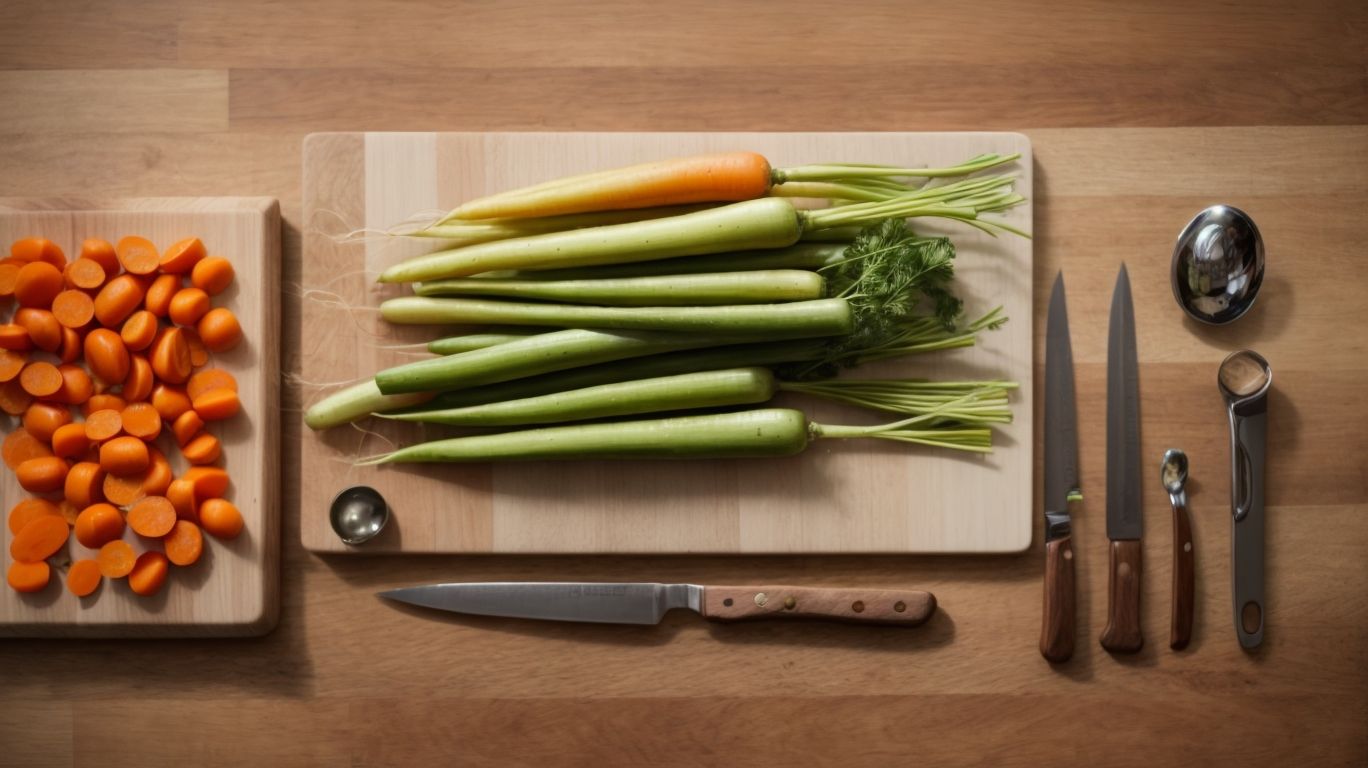
Credits: Poormet.Com – Roger Nelson
Incorporating carrots into your baby’s meals can enhance their nutritional intake and introduce them to a variety of flavors and textures.
Carrots are not only packed with essential nutrients like Vitamin A, potassium, and fiber, but they also add vibrant color and natural sweetness to dishes, making them a favorite among babies.
One delightful recipe idea is carrot and chicken puree, blending tender cooked carrots with lean protein for a balanced meal.
Another great option is carrot and rice porridge, a comforting and easy-to-digest meal perfect for introducing solids.
For a tasty snack, try baking carrot and oatmeal muffins – a nutritious treat that combines the goodness of carrots with the heartiness of oats.
Carrot and Chicken Puree
Combining carrots and chicken in a puree offers a protein-rich and vitamin-packed meal for your baby’s growth and development.
Carrots are an excellent source of beta-carotene, which is essential for eye health and immune function in babies. Pairing this with chicken, which is rich in high-quality protein, helps in overall muscle and tissue development.
This nutritious blend also provides a good dose of iron from chicken, crucial for healthy blood development. The combination of carrots and chicken offers a variety of vitamins and minerals, including vitamin A, vitamin C, and potassium, supporting your baby’s overall well-being.
Carrot and Rice Porridge
Carrot and rice porridge is a comforting and nourishing option for your baby, providing essential nutrients and promoting healthy eating habits.
When making carrot and rice porridge for your little one, start by washing and peeling the carrots before grating them finely. Then, rinse the rice thoroughly to remove any excess starch. In a pot, combine the grated carrots and rinsed rice with water or broth and bring it to a gentle simmer. Allow the mixture to cook until the rice is soft and the carrots are tender.
Feeding your baby this nutritious dish is a great way to introduce new flavors and textures. Carrots are rich in vitamin A, which is essential for vision development, while rice provides a good source of energy to fuel your baby’s active days.
Carrot and Oatmeal Muffins
Bake delicious and nutritious carrot and oatmeal muffins that are perfect for on-the-go snacks and provide a wholesome treat for your baby.
If you’re looking to whip up these delightful treats, you’ll need some essential equipment for baking. Make sure you have a muffin tin, mixing bowls, a grater for the carrots, and measuring cups and spoons on hand. These kitchen tools will help you easily prepare the *mixture* and achieve the perfect consistency for your muffins.
Carrot and oatmeal muffins are not only delicious but also incredibly versatile and convenient. They are ideal for a quick breakfast or as a snack to take with you on busy days. These muffins are packed with nutrients from the carrots and oats, making them a healthy option for both children and adults alike. Their portable nature also makes them a great choice for picnics or lunchboxes, ensuring you have a satisfying and nutritious option wherever you go.
Tips and Tricks for Cooking Carrots for Baby
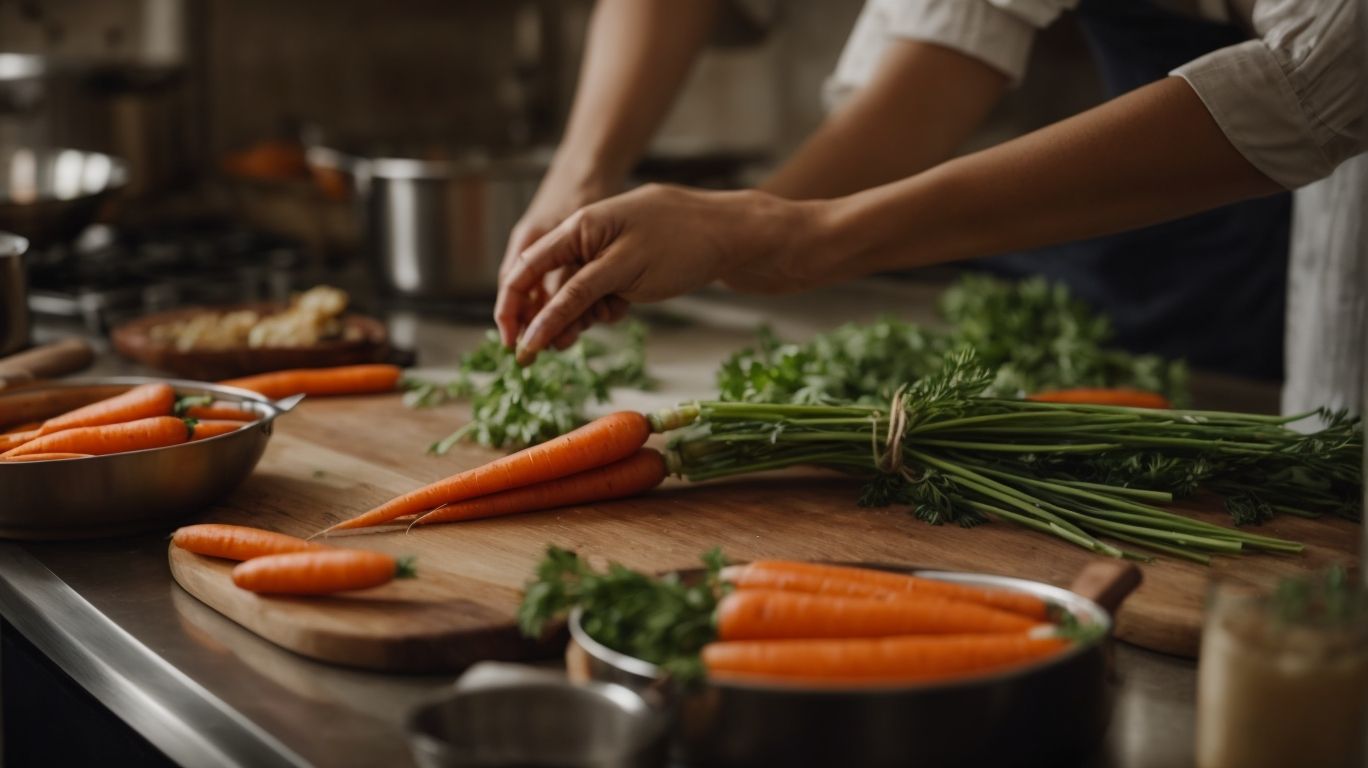
Credits: Poormet.Com – Eric Adams
Master the art of cooking carrots for your baby with these helpful tips and tricks that ensure a safe, nutritious, and enjoyable feeding experience.
Cooked carrots are not only a delightful addition to your baby’s diet but also offer essential nutrients for their growth and development. To enhance the flavor, consider adding a dash of cinnamon or nutmeg for a subtle sweetness. Seasonings like garlic powder or a squeeze of lemon can also elevate the taste profile of the carrots. Remember to introduce new spices gradually to monitor for any allergies or sensitivities.
How to Make Carrots More Palatable for Your Baby
Enhance the appeal of carrots for your baby by incorporating gentle seasonings or natural flavors that encourage them to explore and enjoy this nutritious vegetable.
When introducing carrots to your little one, consider steaming or roasting them to enhance their natural sweetness and make them easier to chew.
Some popular seasonings
- include a pinch of cinnamon or nutmeg to add a hint of warmth,
- a touch of grated ginger for a zesty twist,
- or a sprinkle of mild curry powder for a gentle flavor kick.
These subtle additions can elevate the taste while maintaining the nutritional value.
To make mealtime more engaging, try shaping carrot puree into fun shapes like stars or hearts, or mix it with other pureed fruits or vegetables to create colorful combinations. Engage your baby’s senses by letting them touch and explore the food before tasting, making the experience more interactive and enjoyable.”
How to Store Leftover Carrot Baby Food
Properly storing leftover carrot baby food is essential to maintain its freshness and nutritional quality, ensuring your baby has safe and delicious meals every time.
Once your baby has enjoyed their meal, promptly refrigerate any leftover carrot baby food. Transfer the remaining portion from the feeding dish to an airtight container to retain its flavor and prevent contamination. Store it in the refrigerator for up to 3 days maximum to ensure optimal freshness. When reheating the stored carrot baby food, avoid using a microwave directly as it may cause uneven heating, leading to hot spots that can burn the delicate food.
How to Safely Reheat Carrot Baby Food
Reheating carrot baby food correctly is crucial to maintain its nutritional value and prevent any potential risks of contamination or spoilage.
-
When reheating carrot baby food, it’s important to do so gradually to ensure the food is heated evenly. One safe method is to use a microwave-safe container and cover it loosely to allow steam to escape.
-
For added precaution, always stir the food well during heating and check the temperature with a food thermometer to guarantee it reaches the appropriate heat level for baby consumption.
-
Avoid using plastic containers that may leach harmful chemicals into the food; opt for glass or ceramic containers instead.
Frequently Asked Questions
What are the benefits of cooking carrots for babies?
Carrots are a great source of vitamins and minerals, making them an excellent addition to a baby’s diet. Cooking carrots for babies helps to soften them, making it easier for them to digest and preventing any choking hazards.
How should I prepare carrots for cooking?
To prepare carrots for cooking, start by washing them thoroughly and peeling off the skin. Then, chop them into small pieces to make them easier to cook and consume. You can also steam or boil them for a softer texture.
What is the best cooking method for carrots for babies?
Steaming is the best cooking method for carrots for babies. It helps to retain more nutrients compared to boiling, and the texture is perfect for little ones who are learning to chew.
Can I add spices or seasoning to cooked carrots for babies?
It is not recommended to add spices or seasoning to cooked carrots for babies. Their taste buds are still developing, and these added flavors may be too strong for them. Plain, cooked carrots are the best option for introducing this vegetable to your little one.
How long should I cook carrots for babies?
Cooked carrots should be soft enough for a baby to easily mash with their gums or teeth. This typically takes about 15-20 minutes of steaming or boiling. Remember to always test the carrots yourself before feeding them to your baby to ensure they are cooked enough.
Can I freeze cooked carrots for babies?
Yes, you can freeze cooked carrots for babies. This is a great option for meal prepping or for when you have leftover cooked carrots. Just make sure to thaw them properly before feeding them to your baby.


